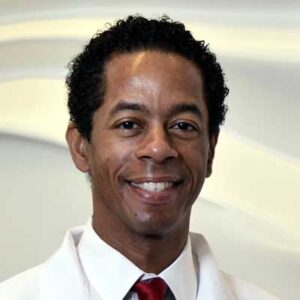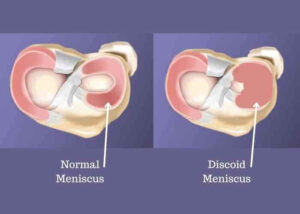Knee Meniscus Injury Specialist

Meniscus injuries are common in athletes and can be caused by sports that involve jumping or quick stopping. Individuals who have a discoid meniscus, have a greater chance of sustaining a meniscus injury in the knee. Knee meniscus injury specialist, Doctor Riley J. Williams provides diagnosis as well as surgical and nonsurgical treatment options for patients in Manhattan, Brooklyn, New York City and surrounding areas who have sustained an ACL injury. Contact Dr. Williams’ team today!
What is a discoid meniscus?
The meniscus is crescent-shaped cartilage located in the knee joint between the femur (thighbone) and the tibia (shinbone). Each knee has two menisci, one on the outside (lateral) and one on the inside (medial). They act as shock absorbers while walking or running. A person suffering from a discoid meniscus has an irregularly shaped meniscus, often half-moon shaped or oval. The discoid meniscus is characterized by being “too big” and is often thicker than a normal meniscus. Discoid meniscus is also known as “popping knee syndrome” due to the sound the injured knee can make. Individuals with a discoid meniscus, which typically occur on the lateral side of the knee, are more prone to injury from sports that require pivoting or cutting. The meniscus can get caught in the knee joint and more easily tear. The cause of discoid menisci is not well understood but believed to be a birth defect. It is common to develop injuries in childhood, but many people do not experience a serious issue. There are three types of discoid menisci: incomplete, where the meniscus is slightly thicker and wider than average, complete, where the meniscus completely covers the shinbone, and hypermobile Wrisberg, where the ligaments that attach the meniscus to knee capsule are missing. Dr. Riley Williams, orthopedic knee specialist, serving Manhattan, Brooklyn, New York City, NY and surrounding areas, has extensive experience in treating patients with discoid menisci and other cartilage defects, repairs and restorations.

What are the symptoms of a discoid meniscus injury?
Many people who were born with discoid menisci may experience symptoms with or without injury. Symptoms may include:
- Popping sound in the knee
- Pain
- Stiffness
- Swelling
- Feeling as though the knee will give out
- Tenderness
- Mechanical locking and catching
How is a discoid meniscus diagnosed?
Dr. Williams will perform a physical examination of the knee by twisted the knee with the leg bent and straightened. A popping sound may be audible during the physical exam. He may order an x-ray and an MRI. The x-ray can show a widened gap between the shinbone and thighbone due to the fact a discoid meniscus is thicker than normal. An MRI will also show the abnormal shape of discoid menisci and if there are any tears in the cartilage.
What are the treatment options for a discoid meniscus?
Non-surgical treatment:
If the injury is not causing issues, treatment may not be necessary. Rest and NSAIDs (non-steroidal anti-inflammatories) such as ibuprofen may provide relief from minor pain, swelling or tenderness.
Surgical treatment:
The treatment of choice for a discoid meniscus is called a partial meniscectomy and is preferred over a total meniscectomy. A partial meniscectomy is done by removing the abnormal central portion of the discoid meniscus, while preserving the rim of the meniscus. A total meniscectomy removes the entire damaged meniscus but can lead to osteoarthritis; total meniscectomy should be avoided if possible.
The discoid meniscus partial meniscectomy procedure is performed arthroscopically. It requires local or regional anesthesia, and the patient can usually go home a few hours after the surgery. This procedure involves Dr. Williams making two small incisions around the kneecap and inserting a small camera called an arthroscope. The arthroscope displays images of your knee on a screen so he can perform the procedure with small, specialized, surgical instruments. Arthroscopic knee surgery offers patients in New York a quicker healing time, less post-operative pain and less chance of infection.
For more information on a discoid meniscus and the treatment options available, please contact the office of Riley Williams, MD, orthopedic knee specialist serving Manhattan, Brooklyn, New York City, NY and surrounding areas.
Locations
610 W 58th Street
New York, NY 10019
148 39th Street, 7th Floor
Brooklyn, NY 11232


